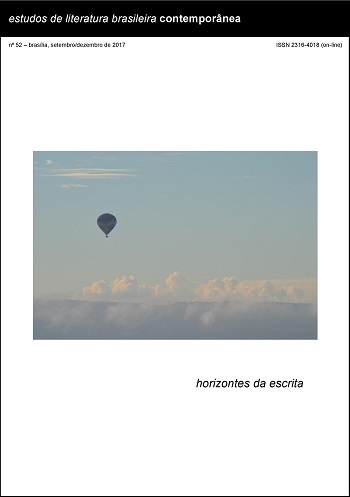The contemporary self-author-writer
DOI:
https://doi.org/10.1590/2316-4018525Abstract
This article examines how the the author’s figure changes once it becomes part of a digital space where this figure can be accessed continuously. This switchover implies some changes in the constitution of the writer’s authorial image, or image of the individual who writes, “l’écrivant”, according to Roland Barthes. The switch to a digital medium delegitimizes the figure of the contemporary author and, therefore, changes his/her role. Thus, the writer’s reaction is to create a spectacle. Using the the concept of “ego-histórias”, personal experiences present in the first-person text, I discuss this theme on hand of some characteristics present in two narratives: O espírito da prosa (2012), by Christopher Tezza, and La parte inventada (2014), by Rodrigo Fresán. I demonstrate how digital media and digital and media culture in general favor a metaliterary reflection on the invention of a self-author-writer who deals with the need for exhibitionism powered by digital media in the constitution of its own image.
References
ARFUCH, Leonor (2010). O espaço biográfico: dilemas da subjetividade contemporânea. Rio de Janeiro: Editora da UERJ.
ARFUCH, Leonor (2014). (Auto)biografía, memoria e historia. Clepsidra. Revista Interdisciplinar de Estudios sobre Memoria, Buenos Aires, n. 1, p. 68-81.
BARTHES, Roland (2010). O grau zero da escrita. São Paulo: Martins Fontes.
DEBORD, Guy (1995). La sociedad del espectaculo. Santiago del Chile: Naufragio.
DI ROSARIO, Giovanna; BORRÀS, Laura (2012). Translating digital literature: two experiences and a reflection. Texto Digital, Florianópolis, v. 8, n. 1, p. 138-162. Disponible en: . Acceso en: 5 mayo 2017.
FRÉSAN, Rodrigo (2014). La parte inventada, Barcelona: Randon House.
FOUCAULT, Michael (2005). ¿Qué es un Autor? Buenos Aires: El Seminario.
GELI, Carles. Rodrigo Fresán: “Casi todo lo que se vincula hoy al escritor me molesta”. El País, Barcelona, 2 abr. 2014. Disponible em: . Acceso en: 5 mayo 2017.
GOICOECHEA, María; SANZ CABRERIZO, Amelia (2012). Literary Reading rituals and practices on new interfaces. Literary and Linguistic Computing, Oxford, v. 27, n. 3.
LEIROZ, Flávia (2008). Ego-escritos: possíveis alternativas de produção teórica. In: CONGRESSO INTERNACIONAL DA ABRALIC, 11., 13 a 17 jul. 2008, USP. Anais... São Paulo: Abralic. Disponible en: . Acceso en: 5 mayo 2017.
MAINGUENEAU, Dominique (2013). Écrivain et image d’auteur. In: DELORMAS, Pascale; MAINGUENEAU, Dominique; ØSTENSTAD, Inger (Ed.). Se dire écrivain: pratiques discursives de la mise en scène de soi. Paris: Lambert-Lucas, p. 13-28.
MEIZOZ, Jerome (2007). ¿Que entendemos por “postura”? In: MEIZOZ, Jerome. Postures littéraires: mises en scène modernes de l’auteur. Traducción de Juan Zapata. Ginebra: Slatkine Érudition, p. 15-32.
NORA, Pierre (Ed.) (1987). Essais d’ego-histoire. Paris: Gallimard.
PRON, Patricio. Rodrigo Fresán contra el fin de la literatura en “La parte inventada”. ABC Cultura, Madrid, 17 mar. 2014. Disponible em: . Acceso en: 5 mayo 2017.
SAAVEDRA, Carola (2012). Nada é verdade, nada é mentira. Jornal Rascunho, Curitiba, n. 144, abr. Disponible em: <http://rascunho.com.br/nada-e-verdade-nada-e-mentira/>. Acceso en: 5 mayo 2017.
SIBILIA, Paula (2008). La intimidad como espectáculo. Buenos Aires: Fondo de Cultura Económica.
TEZZA, Cristovão (2012). O espírito da prosa: uma autobiografia literária. São Paulo: Record.
Downloads
Published
Issue
Section
License
Authors who publish in this journal agree to the following terms:
a) The authors maintain the copyright and grant the journal the right of first publication, the work being simultaneously licensed under the Creative Commons Attribution License-Non Commercial 4.0 which allows the sharing of the work with acknowledgment of the authorship of the work and publication this journal.
b) Authors are authorized to enter into additional contracts separately, for non-exclusive distribution of the version of the work published in this journal (eg publish in institutional repository or as a book chapter), with authorship recognition and publication in this journal.
c) Authors are allowed and encouraged to publish and distribute their work online (eg in institutional repositories or on their personal page) after the editorial process, as this can generate productive changes, as well as increase the impact and citation of published work (See The Effect of Free Access).
d) The authors of the approved works authorize the magazine to, after publication, transfer its content for reproduction in content crawlers, virtual libraries and the like.
e) The authors assume that the texts submitted to the publication are of their original creation, being fully responsible for their content in the event of possible opposition by third parties.


